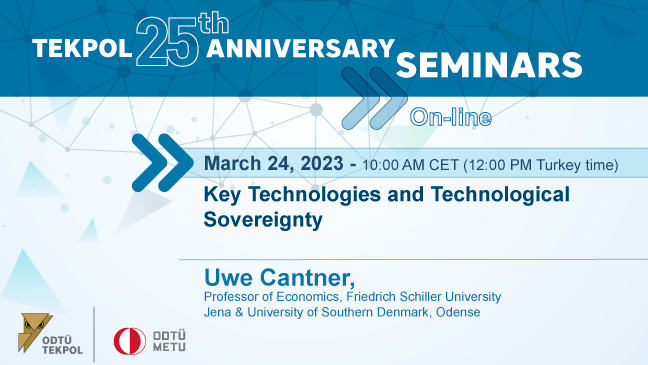TEKPOL 25th Year Anniversary Seminars_Uwe Cantner_24032023
Last Updated:
- English
- Türkçe
Dear TEKPOL Partners,
This year we will be celebrating the 25th Anniversary of TEKPOL's foundation. Therefore we believe it will be a valuable opportunity to reconnect with our partners all over the globe working in the field of science and technology policy making and decided to host a series of online seminars in the spring semester of 2023 academic year.
Our third guest will be Uwe Cantner, from Friedrich Schiller University Jena & University of Southern Denmark, Odense. His presentation title is; Key Technologies and Technological Sovereignty.
The seminar will be held on 24 March (Friday) 2023, at 10:00 CET (12:00 pm Turkey time) , through ZOOM. The Zoom link will be shared with the registered participants before the session.
The moderation of the seminar will be conducted by Prof. Dr. Semih Akçomak from METU TEKPOL.
Registration is mandatory and the form can be reached through this link:
https://forms.gle/hwNRvX92yPHSPTAVA
It is possible to register until Thursday evening before the seminar (23 March 2023)
Kind Regards,
TEKPOL, Science and Technology Policy Research Center
About Uwe Cantner:
Prof. Uwe Cantner holds the chair of Economics/Microeconomics at the Friedrich Schiller University Jena, where he is also Vice President for Young Researchers and Diversity Management.
Furthermore, he is Professor of Economics at the University of Southern Denmark, Odense, Denmark. As visiting professor, Uwe Cantner taught at the Collegio Carlo Albert in Turin, Italy, as well as at various universities in France.
He was and is head of several committees such as the Joseph A. Schumpeter Society, which he headed in 2013/2014. From 2005 to 2011, he was deputy head of the Governing Boards of the DIME EU Network of Excellence (Dynamics of Institutions and Markets in Europe). He was chairman of the scientific advisory board of the Halle Institute of Economic Research (IWH) from 2012 to 2016.
Today, Uwe Cantner is member of the scientific commission of the Mannheim Innovation Panel at the Centre for European Economic Research (ZEW), Director of the Jena Graduate School "Human Behaviour in Social and Economic Change", member of the Board of Directors of the "Schumpeter Centre for the Study of Social and Economic Change" and member of the scientific commission of the Einstein Foundation Berlin.
Uwe Cantner has been a member of the Commission of Experts for Research and Innovation of the German Federal Government since December 2015. Since May 2019 he has been chair of the Commission.
Uwe Cantner is editor of the Journal of Evolutionary Economics and co-editor of numerous other publications. He has published six books and more than hundred scientific essays in international journals to date.
He studied at the universities of Augsburg and Detroit, obtained his doctorate in 1990 at the Ludwig Maximilians University Munich and qualified 1996 as a professor at the University of Augsburg.
His research work focuses on innovation economics in the fields of entrepreneurship and start-up research, cluster, network and transfer research, industrial dynamics, radical and transformative change, science and higher education research, indicators, and research and innovation policy.
About the Seminar:
The notion and problem of sovereignty, first mainly digital sovereignty and then increasingly technological sovereignty is top on the political agenda of quite a number of economies, especially in the EU. The fear of being or getting depednent on other economies, of becoming blackmailable, and therefore of losing the freedom to act- losing sovereignty- is the concern. In this paper we focus on technological sovereignty as problem that is inbuilt into knowledge and innovation competition between economies. For that we (1) conceptualize technological sovereignty along the dimensions of mastery of a technology and availability of a technology. We (2) show by the way of a simple technology gap model how an issue of technological sovereignty can come up and how this translates into worsening terms of trade in an international trade context. Moreover, (3) we give attention to the case of (potential) key enabling technologies and identify empirically issues of technological sovereignty. Finally, and (4) we suggest that a policy framework needs to considering these dimensions strategically and on the basis of a technology portfolio.
















